Cléo from 5 to 7 Blu-ray Movie
HomeCléo from 5 to 7 Blu-ray Movie 
Cléo de 5 à 7Criterion | 1962 | 89 min | Not rated | No Release Date
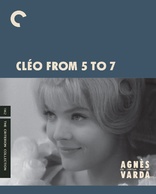
Price
Movie rating
8.1 | / 10 |
Blu-ray rating
| Users | 0.0 | |
| Reviewer | 5.0 | |
| Overall | 5.0 |
Overview
Cléo from 5 to 7 (1962)
A real-time portrait of a singer set adrift in the city as she awaits test results of a biopsy.
Starring: Corinne Marchand, Antoine Bourseiller, Dorothée Blanck, Michel Legrand, José Luis de VilallongaDirector: Agnès Varda
| Foreign | Uncertain |
| Drama | Uncertain |
| Romance | Uncertain |
Specifications
Video
Video codec: MPEG-4 AVC
Video resolution: 1080p
Aspect ratio: 1.67:1
Original aspect ratio: 1.66:1
Audio
French: LPCM Mono
Subtitles
English
Discs
50GB Blu-ray Disc
Single disc (1 BD)
Playback
Region free
Review
Rating summary
| Movie | 5.0 | |
| Video | 4.5 | |
| Audio | 4.0 | |
| Extras | 2.5 | |
| Overall | 5.0 |
Cléo from 5 to 7 Blu-ray Movie Review
Reviewed by Jeffrey Kauffman July 31, 2020 Note: This film is available as part of
The Complete Films of Agnès Varda.
In the wake (figurative or otherwise) of Agnès Varda’s death last year at the age of 90, quite a bit has rightfully been written about this iconic force
in
both
French and global cinema. Varda’s output includes well over fifty credits as a director (including some television entries as detailed by the
IMDb), and aside from listing some of her better known triumphs,
many obituaries and/or eulogies about Varda mentioned any number of other biographical data points, including her rather unique position as a
woman in France’s nouvelle vague movement, her own feminism which was featured none too subtly in some of her films, and her
frequently provocative experimental style. But you know what one of the things that kind of fascinates me personally most about Varda? That she
was married for 28 years to Jacques Demy, from 1962 until Demy’s death in 1990. That Varda, often a purveyor of verité infused
“realism”,
whether that be in outright documentaries or at least ostensibly more “fictional” outings, and Demy, a director whose candy colored, dreamlike and
at least relatively "Hollywoodized" musicals with
Michel Legrand brought a new luster and gloss to French cinema, managed to make a marital go of it for so long is certainly testament to the
maxim
that “opposites attract”, even if those oppositional forces in this instance played out at least in part in terms of what kinds of films the two were
often
best remembered for. If Varda's long marriage to Demy is more than enough reason to celebrate her personal life, her professional life is
beautifully
feted in this rather astounding new set from Criterion, which aggregates an amazing 39 films (albeit some running as short as a few minutes) to
provide what is arguably one of the most insightful
overviews of Varda's cinematic oeuvre. Perhaps unavoidably, but also undeniably movingly, these personal and professional sides of
Varda
merge in at least some of the films in this set, including
The
Young
Girls Turn 25, The World of Jacques
Demy, Jacquot de Nantes, and The Beaches of Agnès.
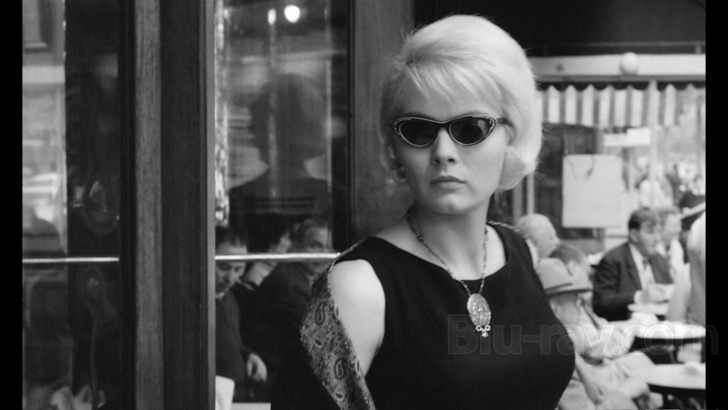
Cléo from 5 to 7 is the film that undeniably put Varda squarely on the cinematic map when it appeared in 1962, though of course the earlier films included in this massive set offer more than enough evidence that Varda, even if not generally recognized, had already been honing her craft for several years. Cléo from 5 to 7 is a fascinating film that plays out in "real time" (hence that from 5 to 7 in the title, although things really don't get much past 6:30), but Varda at least occasionally indulges in some nouvelle vague deconstruction of what Varda herself calls "objective time" with some interesting editing choices, as in an early moment that sees Cléo (Corinne Marchand) exiting from a tarot card reading, which Varda "refracts" by repeating the same few frames several times in a row. The tarot reading itself starts the film on a rather dour note, with hints of mortality, and in Varda's typically provocative fashion, it's the only moment in the film done in color.
Cléo is in fact awaiting a diagnosis from her doctor which she is convinced will be one of mortal illness, and in a quick aside in the film's opening scene, even the tarot reader refuses to give Cléo a palm reading, and later confesses to what one assumes is the reader's husband that Cléo is very ill with cancer. On her way out of the tarot reader's building, Cléo stops in front of a mirror (just the first time she will do something like this), admiring herself and congratulating herself on at least not being "ugly", which she equates as something worse than actual death. Already the film is off on questions of mortality, pride and even perception, and it's only in the first few minutes of Cléo's two hour (give or take) tale.
There are fascinating structural peculiarities in this film throughout. An early scene after the tarot reading finds Cléo distraught in a cafe with her maid Angèle (Dominique Davray), but when Angèle, who is sitting right next to Cléo in what Varda has understandably framed as a two shot, starts regaling two waiters with stories of the village she grew up in, Varda simply repositions her camera to take in two squabbling lovers sitting on the other side of Cléo, on whom Cléo is obviously eavesdropping. Much later in the film, Cléo and another friend of hers, Dorothée (Dorothée Blanck), visit a projection booth in a movie house where the projectionist screens a supposed silent which features Jean-Luc Godard as an almost Harold Lloyd-esque character.
The film also features a really fun sequence that finds legendary composer Michel Legrand as a pianist friend of Cléo's named Bob, who shows up to help Cléo with her nascent singing career. Suddenly, the film is almost a quasi-musical, and with Legrand's participation, seems to be presaging the two famous musical films he would soon make with Jacques Demy. If some of the melodrama in terms of Cléo's expected diagnosis ultimately simply makes her look neurotic for no apparent reason, the film is rife with an almost curious joie de vivre (ironic given its subtext of death), and its "real time" aspect keeps the story involving with a considerable amount of suspense.
Cléo from 5 to 7 Blu-ray Movie, Video Quality 
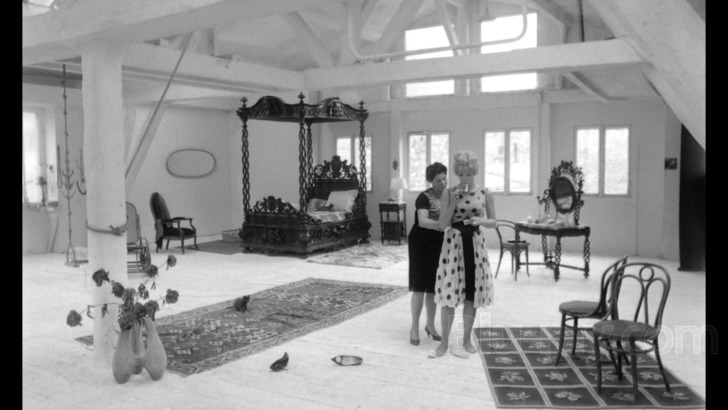
Cléo from 5 to 7 is presented on Blu-ray courtesy of The Criterion Collection with an AVC encoded 1080p transfer in 1.67:1. A prefatory text card discloses this was based on a 2012 restoration, though there's not a lot of other information detailed. While a few niggling qualms may remain that some videophiles feel might have been remedied or outright removed in a newer, more extensive, restoration, such as some brief flashes that dot the frame when Cléo is playing with her kitten when she returns to her flat, this is a generally very beautiful looking presentation. There are occasional variances in clarity in some of the location shots out and about, but for the most part fine detail levels on things like fabrics or even some of Cléo's flyaway hairs are typically very good. Contrast is solid and black levels look great. Grain can be heavy at times, perhaps exacerbated by some of the brighter outdoor material, but resolves naturally throughout. The brief color sequence at the opening also looks fine, though it's part of an optically printed credits sequence, and so has a somewhat grittier appearance.
Cléo from 5 to 7 Blu-ray Movie, Audio Quality 
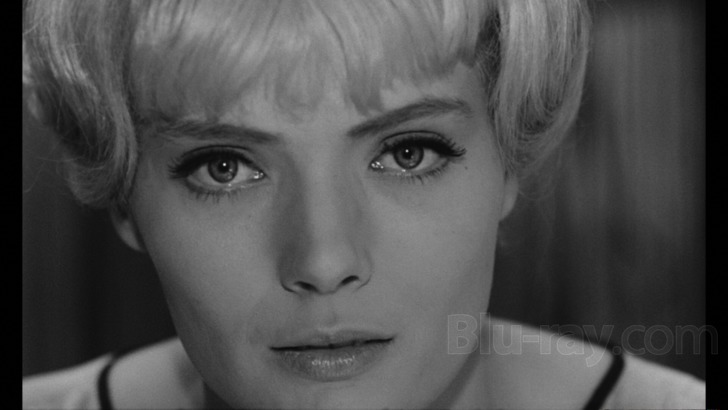
Cléo from 5 to 7 features an LPCM Mono track in the original French. The film has a rather nicely nuanced sound design, with a lot of ambient environmental noises filling the track when Cléo is out and about in some crowded urban settings. The fun sequence with Michel Legrand as Bob the pianist offers some nice music, though there's just the hint of breakup in this scene at some of the higher amplitudes. Otherwise, the score sounds nicely full bodied and problem free. Dialogue is presented cleanly and clearly throughout the presentation. Optional English subtitles are available.
Cléo from 5 to 7 Blu-ray Movie, Special Features and Extras 
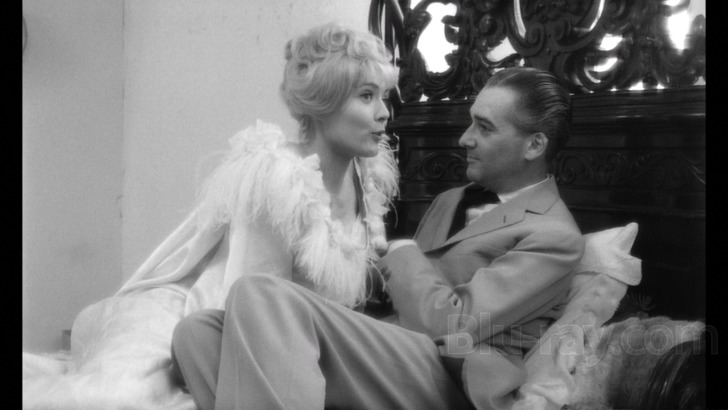
- Remembrances (1080i; 36:01) is a charming piece from 2005 which reunites Varda and several others involved in the film. In French with English subtitles.
- Madonna and Agnes (1080i; 2:24n) stems from 1993, and, yes, it's that Madonna, in a conversation with Varda that ran on French television. In French with English subtitles.
- Cléo's Real Path Through Paris (1080i; 9:17) is a 2005 short by Pierre-William Glenn which retraces Cléo's journeys through Paris. In French with English subtitles.
- The Music of Michel Legrand (1080p; 9:38) is a video essay by Tony Zhou and Taylor Ramos, made in 2016.
- Trailer (1080i; 2:04)
Cléo from 5 to 7 Blu-ray Movie, Overall Score and Recommendation 
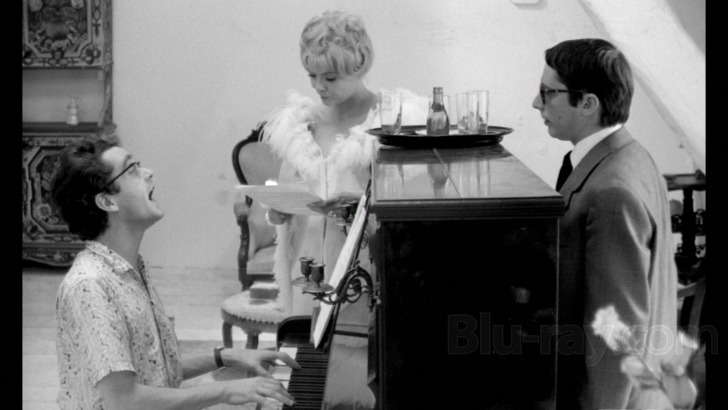
Some wise man like Frank Zappa utilized the old proverb "necessity is the mother of invention", but as Varda discloses in one of the documentaries in this set, the whole "real time" aspect of this compelling film came about simply as a budget saving matter. Beyond that inherently "restrictive" element, though, Varda really goes for the gusto here in terms of both thought provoking content and some extremely stylish shots. The film is surprisingly playful, given some of its morose subject matter. Technical merits are solid, and the supplementary package very enjoyable. Highly recommended.
Similar titles
Similar titles you might also like
(Still not reliable for this title)

La Pointe Courte
1955

Le bonheur
1965

Vagabond
Sans toit ni loi
1985

Jacquot de Nantes
1991

One Sings, the Other Doesn't
L'une chante, l'autre pas
1977

Plaisir d'amour en Iran
The Pleasure of Love in Iran
1976

L' opéra-mouffe
Diary of a Pregnant Woman
1958

Documenteur
1981

Kung-Fu Master!
Le petit amour
1988

Les créatures
The Creatures
1966

The Beaches of Agnès
Les plages d'Agnès
2008

The Gleaners and I
Les glaneurs et la glaneuse
2000

Le lion volatil
2003

Daguerréotypes
1976

Jane B. par Agnès V.
Jane B. for Agnès V.
1988

Les fiancés du pont Macdonald
Les fiancés du pont Mac Donald ou (Méfiez-vous des lunettes noires) / The Fiancés of the Bridge Mac Donald
1961

Lions Love (...and Lies)
1969

Les 3 boutons
2015

T'as de beaux escaliers, tu sais
You've Got Beautiful Stairs, You Know
1986

7 p., cuis., s. de b., ... (à saisir)
1984